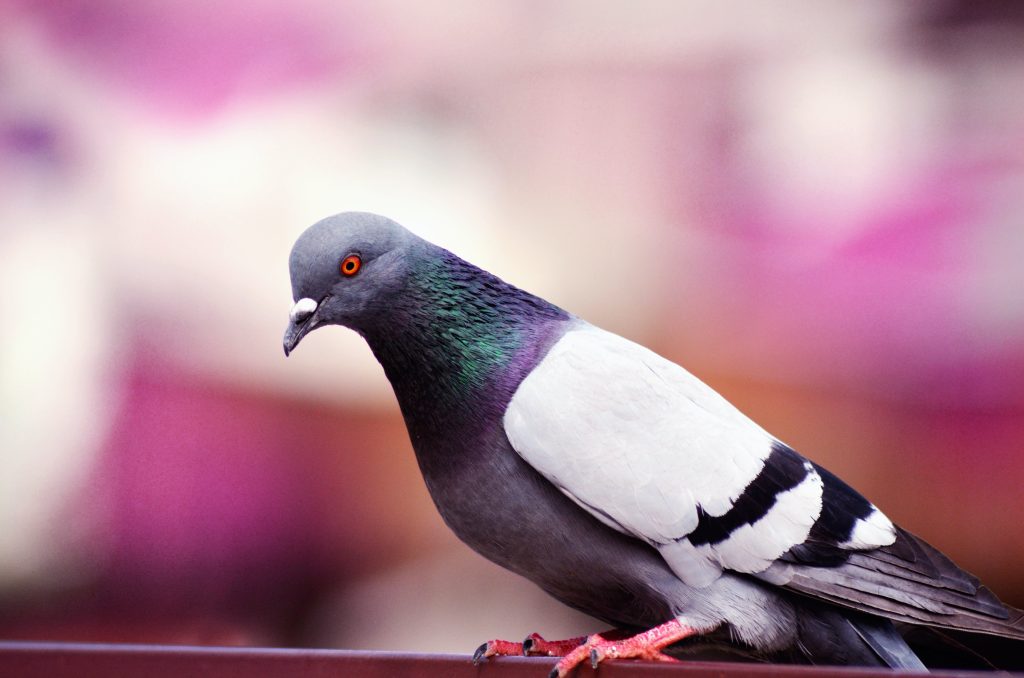Where Do Pigeons Make Nests?
Common pigeons – the ones you see every day in towns and cities – are descended from rock doves, and like to make their nest somewhere that is flat and high up where they can shelter. Wood pigeons, on the other hand, tend to prefer to make nests in dense greenery such as trees and hedges.
As well as commercial buildings and spaces, common pigeons can sometimes roost around our houses, using access to loft spaces or under the eaves of a roof. This not only risks damage to the structure of your building, but they bring with them diseases and droppings. That’s why this month at Pest Defence, we’re going to explore why pigeons nest where they do, how they do it and what you can do about it.

Why do pigeons nest on buildings?
We’re so used to pigeons being around us, that you might not pay any attention to them. But did you know that the reason they nest where they do is largely down to us?
The buildings we create offer unintentional places for shelter in the form of flat roofs and other spaces. Our buildings will also offer a source of heat, providing a comforting spot to build a nest and the potential for proximity to food, whether from bins or simply from the fact that more people means more chance for food to be dropped. Common spots you’ll find pigeons nesting on or in include:
- Unused roof spaces
- Guttering
- Air conditioning units
- Chimneys
- Ledges
With no natural predator in a city or urban space, they flourish and live undisturbed right above our heads. And when you think about it, the tall buildings we make with flat ledges aren’t too dissimilar from the cliffs where the common pigeon’s ancestors would have made their nests.
Looking for fully accredited and effective bird control services near you? Get in touch with our experienced team today.
How to stop pigeons from nesting
There are a variety of tactics you can employ to try and stop pigeons from nesting on your building, whether you’re a business owner or a homeowner. Here are some preventative measures to take:
- Reduce and remove any access to food scraps – Keep your outdoor areas tidy and free from waste to make them less appealing as an easy place to find food.
- Install deterrents – By putting spikes or netting in place to create a physical barrier in place on any ledges, you can make it unappealing as a nesting space.
- Seal off any access points – If you have a chimney, air vent, ducting or an attic, make sure any access points are sealed off to prevent pigeons from getting in and nesting there.
- Predators and reflective items – Pigeons will be easily startled by anything reflective as it creates the impression of movement, while fake predator models, such as owls and hawks, can also keep pigeons from choosing your building.

How do pigeons construct their nests?
Common pigeons in towns and cities have adapted to their surroundings and make the best of what is available to them to construct nests. While this can include the usual sticks and straw, it will more often contain some form of discarded rubbish to help bulk out a nest. These materials are then made more firm and solid structures through an accumulation of droppings around the nest.
Can you move a pigeon nest yourself?
No, you cannot move a pigeon nest yourself, even if it’s on your property. This is because the Wildlife and Countryside Act 1981 makes it an offence, one that carries a fine of up to £5,000 and the possibility of a prison sentence.
In order to deal with a pigeon problem, we first recommend that you use our deterrence tactics listed above. If you’re reading this and you already have pigeons nesting on your building, then you can contact our team here at Pest Defence. As a BPCA pest control company, we can advise you on the best course of action as well as offer a number of expert services to deal with pigeons and deter them.
For more information on pigeon control in Essex and London, regardless of whether it’s for your home, your office or any other commercial environment, simply call our technicians at Pest Defence. We’re always happy to discuss the problem you’re facing with pigeons and recommend the right course of action.


